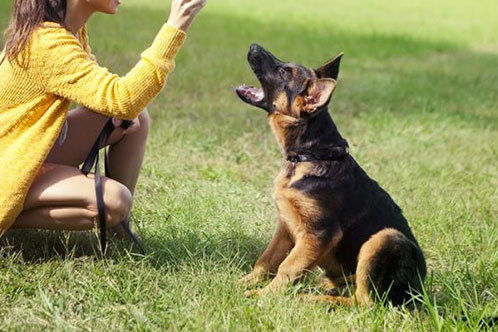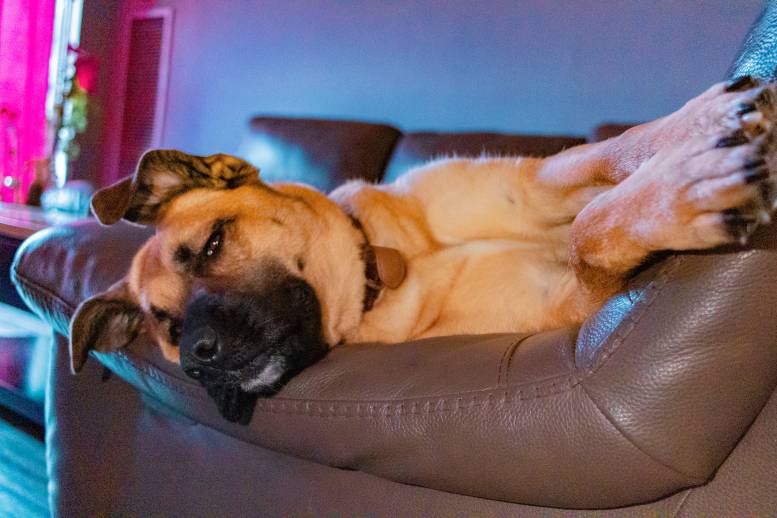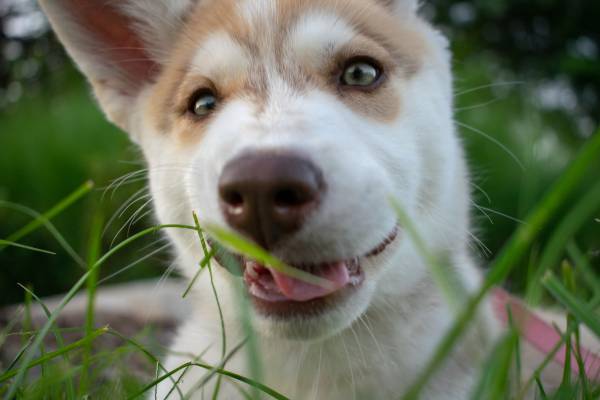Have you always admired wolves and dreamed of having a wolf fur baby? While that may not always be possible, you may choose to adopt the next best thing—a German Shepherd Wolf mix!
Connect with a verified veterinarian in minutes. Licensed vets are available 24/7 to answer your questions. No need to worry about your furry family member.
If you are considering the adoption of a German Shepherd Wolf mix, you’ve come to the right place. We’ve put together all you need to know about these dogs—from their history, to their characteristics, activity requirements and more. Let’s get started!
What is a German Shepherd Wolf Mix?
These are dogs that are a mix of a German Shepherd and a Wolf; in other words, these dogs are crossbreeds. You may sometimes see them referred to as Wolfdogs or Wolf-Shepherds.
The first cross between a German Shepherd and a wolf was done by Leendert Saarloos back in 1932. He crossed a German Shepherd with a Eurasian wolf. His goal was to bring back more natural traits that German Shepherd had lost through domestication.
Other types of German Shepherd Wolf dogs include the Czechoslovakian Wolfdog, the Kunming Wolfdog (from China) and the Lupo Italinao (from Italy).
One thing you must know is that German Shepherd Wolf dogs are illegal in some areas around the US. The reason is that these dogs are considered wild animals and are believed to be unsuitable as pets. This is because dogs that have more wolf in them can be more feral (they act more like a wild wolf). So, you’ll need to make sure it is legal to have one of these dogs where you live, before you adopt a German Shepherd Wolf dog.
German Shepherd Wolf Dog Characteristics & Temperament
When it comes to the dog’s appearance, the German Shepherd Wolf dog will vary, as the way their genes are distributed differs in the resulting puppies. Their appearance depends on their parents, which genes are more dominant, etc. As for coat colors, they usually come in a variety of patters and colors include gray, white, black, sable, or a mix of these colors.
German Shepherd Wolf dogs are large, with a long muzzle, pointed ears and a thick, double-layered coat. Their outer coat is dense and straight, while their undercoat is short and helps keep them warm in cooler temperatures. As a result, these dogs don’t do well in warm climates. These dogs usually weigh anywhere between 50-95 pounds and stand about 24-26 inches tall. However, depending on the genetic makeup of a puppy, it could weigh between 50 to 100 pounds and stand from 20-26 inches or more! Sometimes the puppies can grow to be larger than their parents—you just never know!
When it comes to temperament, the German Shepherd Wolf dog tends to be shy and can become quite aggressive when afraid. They don’t make very good guard dogs, but they can be very protective. These dogs have a very strong prey drive, so they may not be good with other pets or children. They are known for chasing everything in sight. In addition, they are curious by nature, and will try to escape your yard whenever possible. For this reason, you’ll need to have a very secure fenced yard. You may even need to consider installing a taller fence to keep your fur baby in the yard.
German Shepherd Wolf dogs also have another habit that can be irritating for neighbors—they have a tendency to howl. This is because wolves, as pack animals, use howling as a form of communication with their pack in the wild. In addition, your fur baby will be extremely intelligent; however, if your dog is more wolf, then he may be more stubborn, just like his wolf parent and ancestors. However, if your canine companion has more German Shepherd in him, he will be very eager to please and trainable. Training is best done through the use of positive reinforcement methods. Be sure to give your Wolf Shepherd rewards when he does what you ask him to do.
German Shepherd Wolf dogs also require a lot of socialization. In fact, it’s a good idea to get him used to a variety of people and help him learn how to behave in different situations. Always give your fur baby plenty of positive reinforcement, and treats, of course. This type of mixed dog is best for pet parents who are experienced with training dogs that have a strong will, and who can be firm and consistent in their approach to training the Wolf Shepherd. One more fact—if you have a Wolf Shepherd puppy, he may not show wolf-like behaviors until he’s completely grown up!

Review symptoms, medications & behavior to keep your pets healthy with a Vet Online in just minutes.
Ask a Vet Live NowGerman Shepherd Wolf Dog Exercise Needs
These dogs are highly energetic—keep in mind that wolves are able to travel 30 miles a day! As a result, you’ll need to make sure your Wolf Shepherd gets about 1-2 hours of exercise each day. If not, your fur baby may end up becoming destructive. It’s also best to have a fenced back yard that is large enough for the dog to roam and play.
When it comes to playing, it’s not a good idea to take a German Shepherd Wolf Shepherd to the dog park. And when you’re out for a walk with your canine companion, always put him in a harness and keep him on the leash at all times.
Grooming
German Shepherd Wolf dogs are going to shed—they do this about twice a year. So, you’ll need to brush your fur baby a few times a week to help get rid of excess hair, as well as keep his fur from becoming snarled and matted.
As for bathing, a Wolf Shepherd doesn’t need to be bathed very often. Too much bathing could irritate his skin, as well as make his coat unhealthy and dull.
Feeding
Your Wolf Shepherd needs a diet high in protein; regular dog foods are not a good choice to keep your dog healthy. Instead, you might consider a raw food diet that contains plenty of protein. Keep in mind he needs at least 50% protein in his meals.
If you choose a raw diet for your fur baby, it’s probably a good idea to check with the vet to see if your dog may require supplements to make sure he gets enough vitamins and minerals.
Health Issues
Wolf Shepherds tend to be healthy, but they can still inherit certain health issues from their parents. These may include:
- Hip/elbow dysplasia
- Gastric torsion (also known as bloat)
- Tumors
- Injury
- Prone to respiratory issues
- Heart-worm
- Skin issues
If you’re interested in a German Shepherd Wolf dog, be sure to see if these dogs can legally be kept as pets in your area.
Overall, Wolf Shepherds are beautiful and amazing, and are highly intelligent. However, due to their wolf genes, these dogs can be unpredictable. Even so, for the right pet parent, German Shepherd Wolf dogs can make loyal, loving companions.
Connect with a verified veterinarian in minutes. Licensed vets are available 24/7 to answer your questions. No need to worry about your furry family member.

Kyoko
Kyoko is from a family of 3 and moved to New York with her parents and siblings when she was 13. Kyoko is fond of spending a great amount of time with pets, specifically her beagle Luna and cat Missy. Her boyfriend often complains that she spends too much time giving attention to their animals. Kyoko has written dozens of articles concerning pets and is aiming at owning a pet shop one day!
Review symptoms, medications & behavior to keep your pets healthy with a Vet Online in just minutes.
Ask a Vet Live Now



